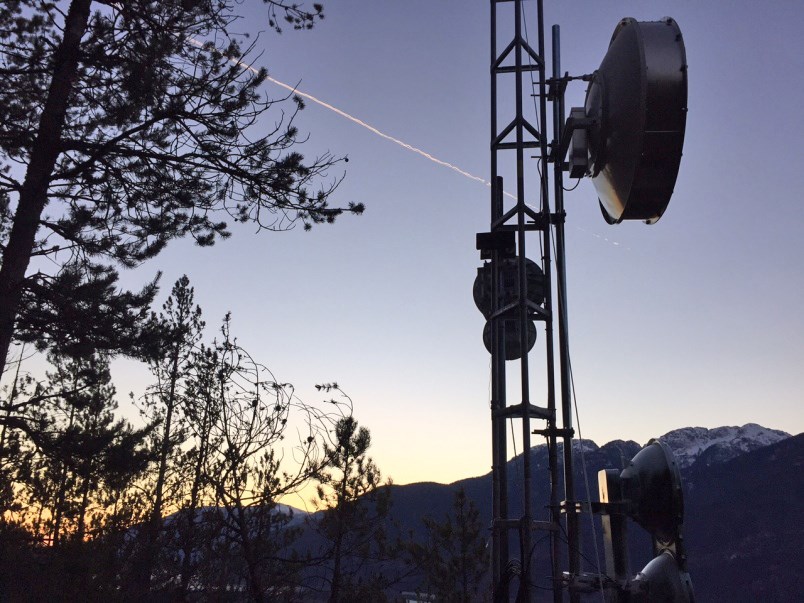Coasters who are desperate for better cell phone service may have a remedy in sight – or maybe not.
According to discussions at the most recent board meeting of the Sunshine Coast Regional District (SCRD) and also questions at the federal level, Telus or another company may extend the current wireless zones. But sources differ, with one company saying the federal government may block efforts for better service.
Shoddy wireless coverage endangers rural residents of Area A, said Frank Mauro, SCRD director for the area. There is virtually no signal north of Pender Harbour, except for the Earls Cove ferry terminal and a small area around it, he said.
“It’s brutal,” he said, just before newly elected SCRD chair Bruce Milne called the Nov. 23 meeting to order.
Mauro reported that Egmont area residents had set up a meeting with Telus to ask the company to improve service. “But they [Telus] cancelled at the last minute,” he said.
Nonetheless, he said, he expects eventual, positive action from the company.
About 40 people attended the community meeting in Egmont, which Mauro pegged as a huge turnout for the area. Pamela Goldsmith-Jones, member of Parliament for the Sunshine Coast, sent her constituency assistant Lucie McKiernan there on her behalf.
George Connell, from Earls Cove, helped organize the Nov. 16 event. He was irate about the no-show, which was the third time over three months Telus had been invited to a meeting and declined, he said.
Wireless coverage is a public safety issue, Connell said. “With so many tourists coming up to Skookumchuck [Narrows] Provincial Park, you can get stuck on the trail without a way to call for help.”
More than a year ago, Base Wireless and also Beacon Wireless showed interest in servicing the Earls Cove-Egmont area, but their plans seem to have ebbed, Mauro said. “The issue is cost for them, which would have to be passed along to consumers.”
However, Davin Peterson, owner of Base Wireless, cites a different problem.
“It’s a monopoly here in Canada,” he said. “We can’t get the licences from the federal government.” He said the monopoly is held by three companies: Telus, Bell and Rogers.
About a year ago, Ian Winn, SCRD director for Area F, took Peterson on a tour of West Howe Sound.
Peterson was looking for high-elevation sites where Base could convert existing fibre optic signals into wireless radio signals. These could have been transmitted to under-served parts of Area F, Winn explained. He identified the areas as West Howe Sound north of Twin Creeks, some parts of lower Langdale, and Keats and Gambier Island.
However, Peterson said Tuesday that the company has backed off from establishing cell service on the Sunshine Coast because of the licensing problem.
There is some good news, though, he said. Base will be bringing fibre Internet to Gambier Island early next year. The company plans to install local access points near the Centre Bay and Hope Point areas.
After Telus’s no-show at the Egmont meeting, Mauro called the company and scheduled a meeting with a senior person for early December. “I think they’ll be getting something going shortly,” he said.
Areas with concentrated population have better coverage, directors at the SCRD meeting said. The signal in Pender Harbour is adequate, according to Mauro, and Roberts Creek director Mark Lebbell and District of Sechelt director Darren Inkster said the signals in their communities are fine.
In areas that are not so fine, federal relief may be the answer. Goldsmith-Jones said on Nov. 24 that she is working to see whether Connect to Innovate would subsidize better wireless service on the Coast.
Under the federal program, Canada is investing $500 million to bring high-speed Internet to remote communities that are challenged by geography and small populations. Whether that applies to cell phone service or whether Area A is isolated enough, is yet uncertain.
A provincial grant may also be possible, Winn said.



